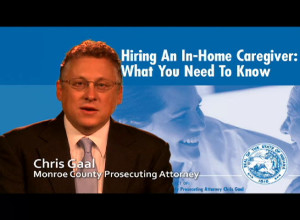Hiring an In-Home Caregiver
There are times in our lives when, due to health problems or age, we find we need help in our homes with things we could previously do on our own. Or we may need to hire someone to help care for older relatives, or a family member who is sick. Thankfully, there are good caregivers and agencies that provide in-home services to help meet those needs. Unfortunately, problems can come up when a caregiver comes into your home, and has access to medications, confidential information, or personal property.
The Monroe County Prosecutor’s Office wants to provide the information you need to help you make good decisions about hiring an in-home caregiver, avoid problems, and know who to call if problems do occur. We also want to encourage you to think about these issues and become familiar with these resources before they are needed. Planning for future needs will make the process much easier when the time comes to hire a caregiver.
Click here to download the Hiring An In-Home Caregiver fact sheet.

